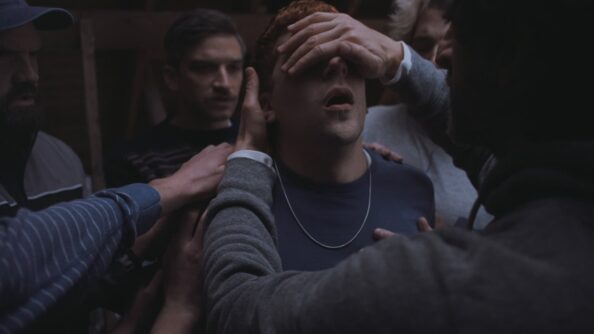Manodrome, directed by John Trengove, is a perplexing exploration of one man’s descent into a tumultuous world of masculinity, power dynamics, and internal turmoil. With a stellar cast including Jesse Eisenberg, Adrien Brody, and Odessa Young, the film delves deep into the psyche of a protagonist, Ralphie (Jesse Eisenberg), whose life takes a dark and unsettling turn after encountering a group of men led by the enigmatic “Dad Dan” (Adrien Brody).
The Good:

The narrative initially introduces Ralphie, a rideshare driver coping with unemployment, financial strain, and the impending responsibility of impending fatherhood with his girlfriend, Sal (Odessa Young). Eisenberg delivers a commendable portrayal of Ralphie, capturing the character’s vulnerability and desperation as he navigates through a series of unsettling encounters.
The film’s storyline orbits around Ralphie’s immersion into a secretive group of men, each bearing a peculiar tattoo. Led by the charismatic and manipulative Dad Dan, played with an eerie charm by Adrien Brody, this group presents a facade of camaraderie and empowerment while masking a toxic underbelly of misogyny and control. Trengove deftly crafts an atmosphere of discomfort and foreboding, as Ralphie becomes entangled in this web of toxic masculinity, highlighted by the group’s unsettling ideologies and practices.
The film’s narrative takes unexpected and darkly intense turns, mirroring Ralphie’s escalating inner turmoil. Eisenberg’s nuanced performance effectively portrays Ralphie’s gradual descent into a vortex of rage, confusion, and vulnerability, emphasizing the character’s struggle with his own identity and the influences that push him towards violent outbursts and self-destruction.
The Bad:

Despite the film’s compelling performances and the eerie atmosphere created by Trengove, the storyline often feels disjointed and lacks cohesive progression. The abrupt shifts in Ralphie’s behavior and the narrative’s erratic pacing might leave audiences disconnected and bewildered, failing to fully engage them in Ralphie’s disturbing journey.
Furthermore, while the film attempts to explore complex themes of masculinity, power dynamics, and the impact of absent paternal figures, it often falls short in providing a deeper, more cohesive exploration of these themes. The portrayal of the group’s misogyny and the protagonist’s ensuing actions, at times, feels gratuitous and fails to add substantial depth to the overarching narrative.
The character dynamics, especially between Ralphie and Dad Dan, show promise but remain underdeveloped, leaving audiences craving a more profound exploration of their relationship dynamics and the catalysts behind Ralphie’s increasingly erratic behavior.
Moreover, the film’s climax and resolution may leave viewers dissatisfied, as the narrative concludes abruptly, lacking a satisfying resolution or a conclusive insight into Ralphie’s character arc. The final sequence, while attempting to offer a glimpse of redemption, feels rushed and inconclusive, leaving audiences with more questions than answers.
Overall:
Manodrome presents a gripping premise and commendable performances from its cast, notably Jesse Eisenberg’s portrayal of a man grappling with inner turmoil. However, the film’s disjointed narrative, underdeveloped themes, and abrupt resolution detract from its potential impact, resulting in a viewing experience that feels incomplete and somewhat unsatisfying.
For audiences seeking a challenging and unsettling exploration of masculinity and psychological turmoil, Manodrome offers glimpses of intrigue but ultimately falls short of delivering a cohesive and fulfilling cinematic experience.
Manodrome Review: A Chaotic Spiral into Psychological Turmoil
-
Acting - 7/10
7/10
-
Cinematography/Visual Effects - 7/10
7/10
-
Plot/Screenplay - 4/10
4/10
-
Setting/Theme - 5/10
5/10
-
Watchability - 5.5/10
5.5/10
-
Rewatchability - 4/10
4/10















